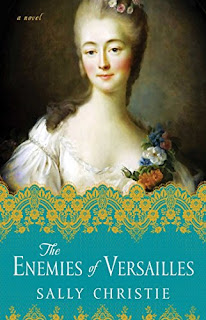Atria Books, March 21, 2017.
Four Stars
The Enemies of Versailles is the final
novel of the Mistresses of Versailles trilogy, which follows the life of King Louis
XV of France through the eyes of the women he loves and lusts after – from the
Nesle sisters to the Marquise de Pompadour and finally the Comtesse du Barry.
Although each consecutive book tells us more about the King and the tumultuous
history of France, the novels also work well as standalones.
In this novel, the focus is on young Jeanne Becu, a
girl of humble birth who uses her great beauty to rise above the streets of
Paris and into the Palace of Versailles. King Louis is now much older and very
jaded, but he falls for the youthful energy of Jeanne, the Comtesse du Barry.
However, other members of the royal family are not so enamoured with the newest
mistress of Versailles – the princesses are now grown up, and are completely
scandalized by their father’s latest lover. It was one thing to tolerate the bourgeois
Marquise de Pompadour, but the Comtesse is a commoner from a family of
prostitutes.
The princesses are led by the very prim and proper
Madame Adelaide, who is horrified by her father’s lowborn mistress. She goads
her sisters into taking her side, and even the young Marie Antoinette is
brought into the family fight. However, as the revolution rises outside the
palace gates, everyone in the royal family must work together in an ill-fated attempt
to survive.
Christie once again adds new elements to the genre of
historical fiction – she explores the intricacies of 18th century
French political intrigue, while remaining witty and modern in tone. This was a
male-dominated period of history, and it is interesting to see it being
revisited from a female perspective. Although Marie Antoinette is a popular
fictionalized character, it’s nice to see some other points of view as well –
specifically, Madame Adelaide and the Comtesse du Barry, who alternate the
narration of this novel. However, I did find the different voices to be a bit
too similar, even in comparison to the earlier novels in the series.
King Louis obviously preferred the charms of his
various mistresses to the actual work of ruling France. He leaves the hard work
to his advisors, who all put their own ambitions before the wellbeing of the
country – clearly a major contributing factor to the French Revolution. Because
of the tumultuous historical setting, this novel is probably the most
interesting of the series plot-wise – but I just did not enjoy it as much as
the other two. It is still a great piece of historical fiction, but I just felt
that the first in the series was the strongest. Regardless, I will be looking
forward to whatever Christie decides to write next.
I received this book from Atria Books and NetGalley in
exchange for an honest review.

No comments:
Post a Comment